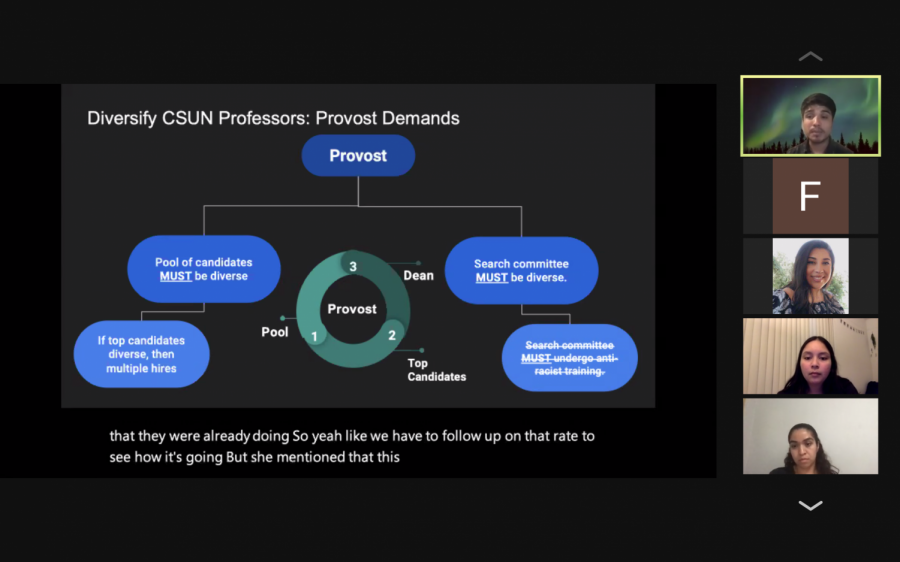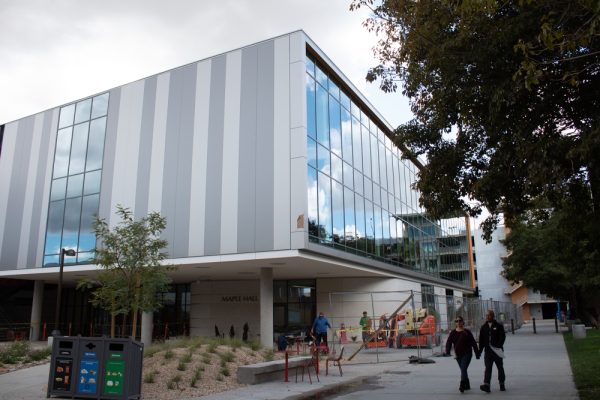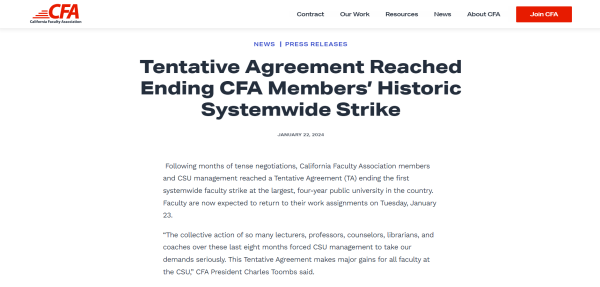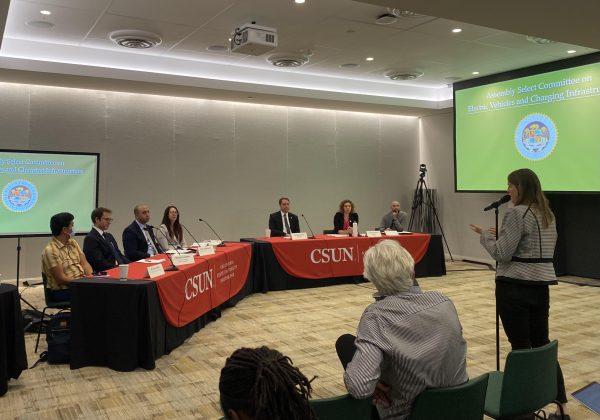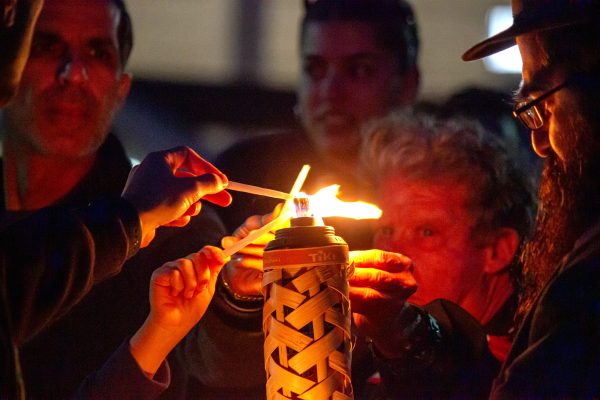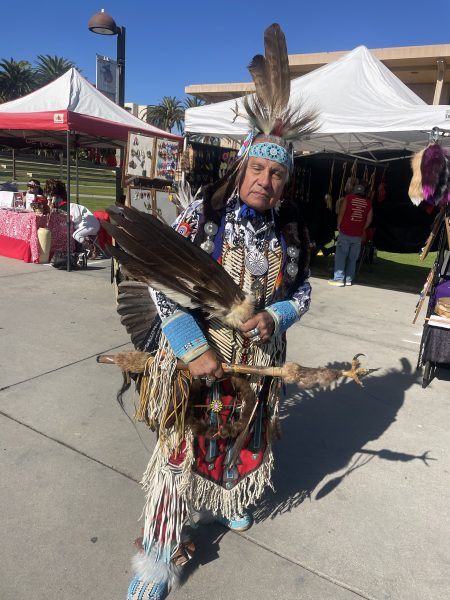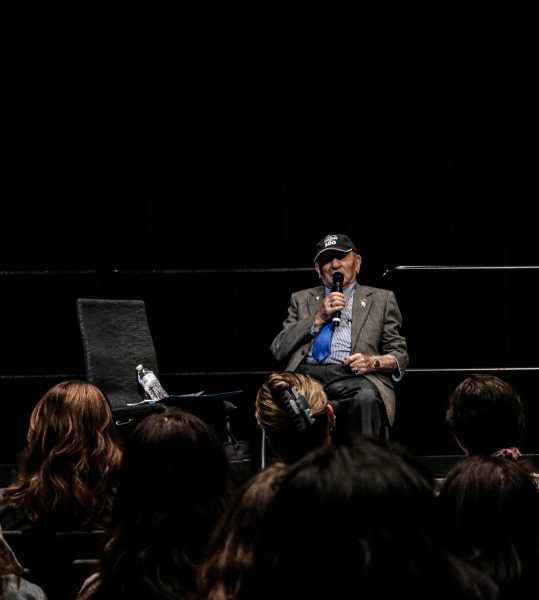Students demand CSUN to diversify faculty population
Daniel Garcia, top right, the founder of Colored Minds, discusses the demands the organization has for CSUN Provost Mary Beth Walker on diversifying the CSUN faculty population on Wednesday, March 10, 2021.
March 16, 2021
When Luis Paz de la Vega, a first-generation college student, was applying for the master’s program in psychology at CSUN, he felt lost throughout the process. Eventually he met a Latina professor who would guide him through the program once he shared his goals with her.
After four years of working with her, de la Vega wanted to know why this professor chose to mentor him.
He recounted what the professor said to him: “‘I’m just like you. I am a Latina. I know what it’s like to have to work, I know what it is like to have to struggle and I know what it is like to get a chance and opportunity to do something.’” Without the support of his professor, de la Vega said he never would have had the experience he has right now.
De la Vega is one of many students who attended a virtual demonstration hosted by Colored Minds on March 10. Daniel Garcia, a graduate student and founder of Colored Minds, organized the event to gather perspectives and support from students before meeting with Provost and Vice President for Academic Affairs Mary Beth Walker on March 17 to discuss diversifying CSUN professors. Students of color shared their experiences and explained the importance of having diverse professors.
Colored Minds is a nonprofit organization working on dismantling systemic inequalities
The organization is currently working on diversifying CSUN professors by advocating for more tenured and tenured track professors of color.
The goal is to integrate professors of color within the system so they can start enacting real change for marginalized communities on campus.
According to CSUN Counts, as of fall 2020 there are 136 Black and Latinx tenured and permanent faculty. Meanwhile, there are 458 white tenured faculty. The Black and Latinx faculties are clustered into college departments such as the College of Humanities, where the ethnic and cultural studies programs are housed in.
There are currently zero Black and Latinx tenured faculty for the College of Engineering and Computer Science. There are five Black and Latinx tenured professors in the College of Business and Economics, and seven Black and Latinx faculty members in the College of Education. When looking at the white tenured and tenure track faculty, they are spread out in high numbers across all eight colleges at CSUN.
Karen Garcia is pursuing her teaching credential at CSUN. She said most of her professors in her program are white. She is currently taking an English language learner course that she said is taught by a white professor.
“She does provide a lot of skills, but for me, I’m being taught by someone who has probably never been an English language learner herself,” Garcia said.
Daniel Garcia has never had a psychology professor who is a person of color. Garcia is a first generation college student whose parents do not speak English and do not have a college education. He believes a white professor will struggle to understand his life. However he acknowledges the impact they have had on his academic career.
“[White psychology professors] have helped me to get where I am today and they have given me the stepping stones. They inspired me, they even pushed me to do more and to do better, but they never once empowered me,” Garcia said.
Colored Minds met with Chief Diversity Officer Natalie Mason-Kinsey on Feb. 5, where they hoped her position would lead to a pathway to diversify professors. But Mason-Kinsey replied “faculty hire faculty.”
Three days after speaking with Mason-Kinsey, CSUN’s President Erika D. Beck appointed Amanda Quintero to a newly created position in response to her listening tour — Special Assistant to the President for Inclusive Excellence. Quintero, a first-generation college graduate and daughter of immigrant parents, has over 20 years of experience working to advance educational equity and student success.
Garcia said the student body does not need more individuals that hold positions with a fancy title and cannot make sufficient change. Instead, hiring tenured and tenure track faculty of color will bring lasting and substantial change at CSUN, as these are the professors that are going to engage with the community for decades.
“What is the point of having these figure head positions if they can’t actually put individuals of color in positions that are going to enact change in the community,” Garcia said.
CSUN developed a 10-step action plan for improving diversity, equity and inclusion for Black faculty, staff and students after last summer’s Black Lives Matter movement caught national attention. However, according to Garcia, none of the 10 steps were addressed during the meeting with Mason-Kinsey. When Garcia looked at the website for the Commission on Diversity & Inclusion, he said there were no upcoming events and meetings scheduled for the committee. The last published meeting on the website was May 2019.
Mason-Kinsey said the university is making progress on a number of actions from the 10-step action plan. The university is collaborating with Educational Opportunity Program, Student Outreach and Recruitment and the Office of Student Success which will carry out new recruitment, retention and graduation plans for Black students. They have also recruited two faculties in Faculty Affairs who will review recruitment, hiring policies and other procedures that they find to limit diverse faculty ranks. In addition, the administration is working with the Institute for Teaching and Learning which will offer tools for faculties when addressing equity gaps in their classes.
She said commissioners and campus leaders are working with students, faculty and staff in workgroups which will ensure that the initiatives continue to be addressed. “We will continue to see positive progress through the efforts of these leaders, members of the Commission on Diversity and Inclusion, and workgroups,” said Mason-Kinsey.
Colored Minds demands a hiring search for a diverse pool of candidates. Garcia said search committees are not diverse since they are built from white tenured and tenure track faculty. He said a diverse search committee will look for candidates that reflect the student body.
Garcia said students feel more connected to the professor who have lived through the same experience from students of color. It does not matter what elite institution the professor came from as long as they can encourage students to thrive.
“I want people from my community to go to CSUN and feel empowered. I want them to see people that look like them,” Garcia said.
Cecilia Oropeza is a child and adolescent major who has two Latinx professors who helped her find a sense of identity at CSUN this semester. She believes students need to unite to hold the university accountable — not only for herself but for her children as well.
“I want to make sure that my little girl and my little boy have an opportunity. If they want to be engineers I want them to feel like they have a sense of identity that they are empowered that they have a purpose because of these folks that look like them,” said Oropeza. She wants to make sure her children do not face any discrimination but feel represented in their academic endeavors.
Colored Minds encourages students to help the organization by signing and sharing the Diversify CSUN Professors survey. The survey aims to highlight the lived experiences of students that have come from the lack of diverse faculty.
